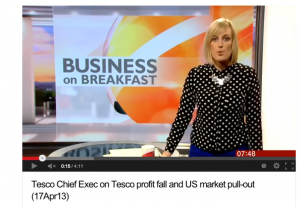Teso is the UK’s biggest supermarket chain, and the second-largest retailer in the world measured by profits (after Wal-Mart). Recently, Tesco said profits fell 67% in Europe to £55m, while Asian profits, excluding China, dropped 7.4% to £314m.
From a overall viewing, the main reasons for this drop come from two aspects: rival competitors and consumers. Although right now Tesco is holds a lagger market share than its rivals in Asia, the total market share has fell from 30.9% to 20.2%, where as rivals like Sainsbury increased its market share from 0.2% to 16,6%. The battle becomes tougher with discount discount supermarkets such as Aldi and Lidl, besides existing competitor. Also, due to little improvement in consumers’ spending power in UK, there is less pessimism around. As the UK is still recovering from the economic recession, people’s real disposable income hasn’t increased much.
Under this situation, The UK firm decided to combine its Tesco China business, with the 2,986 stores held by CRE’s (China Resources Enterprise Vanguard) business. It is the third-largest supermarket chain in Hong Kong. It operates approximately 450 stores in Hong Kong and the Chinese municipalities.This strategy hopefully would help to pull up Tesco’s overall market share by utilizing Chinese people’s improving purchasing power, and the net profits might cover the continuous loss in tough European market to some extent.
Video Link: https://www.youtube.com/watch?v=zKrZBW2RRXA
Reference:
http://www.bbc.co.uk/news/business-24361465
http://www.bbc.co.uk/news/business-24374863
http://en.wikipedia.org/wiki/Tesco


